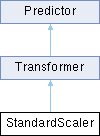#include <Scaler.h>

Public Member Functions | |
| StandardScaler (bool withMeans=true, bool withStd=true) | |
| void | fit (const Matrix< double > &X, const Matrix< double > &y) override |
| Matrix< double > | transform (const Matrix< double > &in) override |
 Public Member Functions inherited from Transformer Public Member Functions inherited from Transformer | |
| Matrix< double > | predict (const Matrix< double > &in) override |
| virtual void | fit (const Matrix< double > &X, const Matrix< double > &y)=0 |
| virtual Matrix< double > | predict (const Matrix< double > &)=0 |
| virtual Matrix< double > | transform (const Matrix< double > &)=0 |
Public Attributes | |
| Matrix< double > | means |
| Matrix< double > | std_deviations |
Private Attributes | |
| bool | with_std = true |
| bool | with_means = true |
Detailed Description
Standarize features by removing the mean and scaling to unit variance.
The standard score of a sample $x\inX$ with $X\in\mathbf{R}^{N\times M}$ is calculated as $$ \tilde{x} = \frac{x - \mu}{\sigma} $$ with
- $\mu\in\mathbf{R}^M$ the mean of the training samples
- $\sigma\in\mathbf{R}^M$ the standard deviation of the training samples
Note: Standardization of a data set is a common requirement for many ML estimators: They might behave badly if the individual featrues do not more or less look like standard normally distributed data.
For instance many elements used in the objective funtion of a learning algorithm assume that all features are centered around 0 and have variance in the same order. If a feature has a variance that is orders of maginiteds larger than others, it might dominate the objective function and make the estimator unable to learn from other feaztures correctly as expected.[^1]
- Examples
- ds/preprocessing/TestScaler.cpp.
Constructor & Destructor Documentation
◆ StandardScaler()
|
inline |
Member Function Documentation
◆ fit()
|
inlineoverridevirtual |
Computes mean and sds to be used later in scaling.
- Parameters
-
X given matrix to use to calculate mean/standard deviations y unused
Implements Predictor.
◆ transform()
Perform standarization by centering and scaling
- To achieve center at 0 and unit variance.
- Parameters
-
in Data to transform
- Returns
- : transformed data
Implements Predictor.
Member Data Documentation
◆ means
| Matrix<double> StandardScaler::means |
◆ std_deviations
| Matrix<double> StandardScaler::std_deviations |
◆ with_means
|
private |
◆ with_std
|
private |
The documentation for this class was generated from the following file:
- include/math/ds/preprocessing/Scaler.h